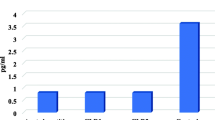Abstract
Increased serum concentrations of liver enzymes are sometimes observed, in the absence of clinical symptoms of liver disease, in patients with Turner syndrome. The purpose of this study was to evaluate, in our Turner patients, serum liver enzyme levels and to find a cause for their increase. In 70 Turner patients, serum AST, ALT, GGT levels were evaluated every 6 months during a period of 0.8–21.9 years. In patients in whom increased values of liver enzymes were found, serological markers for infectious hepatitis, serum hepatitis C virus RNA and virus genotype, IgG and IgA antibodies to gliadin and endomysium, coeruloplasmin, copper, α1-antitrypsin, total proteins and electrophoresis, IgG, IgA, IgM, fibrinogen, prothrombin, alkaline phosphatase, creatine kinase and total and direct bilirubin were also determined. Antinuclear, anti-smooth muscle and anti-liver-kidney microsome antibodies together with antithyroglobulin and anti-thyroid peroxidase antibodies were determined in all patients and in 166 age-matched female controls. In 22 patients, increased liver enzymes were observed, not related to karyotype. Follow-up showed that the hepatic disorder did not worsen with the time. Serological markers of hepatitis C virus were positive in three patients. When the serum liver enzyme increase was first observed in the other 19 patients with high enzyme levels (group A), 14 patients had never been submitted to hormonal treatment, 4 were on oestrogen/gestagen treatment and 1 was being treated with both growth hormone and oestrogen. Coeliac disease, α1-antitrypsin deficiency and Wilson disease were ruled out by appropriate investigations. In 8/19 group A patients, antinuclear and/or anti-smooth muscle antibodies were present versus 6/48 of patients with normal liver enzymes (group B). Thyroid antibodies were found in 8/19 patients in group A and in 13/48 in group B. Weight excess SDS was significantly higher in Turner girls with liver enzyme increase. Ultrasonography, performed in 17 patients of group A, showed mild hepatomegaly in 4 and increased echogenicity with fatty infiltration in 6.
Conclusion Hepatic abnormalities in Turner syndrome are not progressive. Oestrogen should not be considered the main cause of increased liver enzymes in Turner syndrome since most of our patients with this finding had not been previously treated with oestrogens. An auto-immune pathogenesis might be considered in some cases, whereas the association with weight excess seems the most frequent cause of liver disorder in Turner syndrome.
Similar content being viewed by others
Author information
Authors and Affiliations
Additional information
Received: 1 November 1998 / Accepted: 20 May 1999
Rights and permissions
About this article
Cite this article
Larizza, D., Locatelli, M., Vitali, L. et al. Serum liver enzymes in Turner syndrome. Eur J Pediatr 159, 143–148 (2000). https://doi.org/10.1007/s004310050038
Issue Date:
DOI: https://doi.org/10.1007/s004310050038




